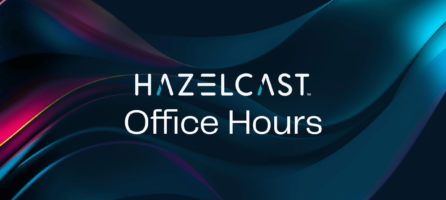Jet 4.2 is Released!
Jet 4.2 is finally here! Here’s an overview of what’s new:
Change Data Capture Support for MySQL and PostgreSQL
Previously, Jet has had support for Debezium as a contrib package. We’re happy to announce that we’ve made several improvements to this package and decided to make this a part of our main release.
Debezium was developed initially as a Kafka Connect module, which can read the snapshot and changes of relational databases such as MySQL and PostgreSQL. Jet’s Debezium integration removes the Kafka dependency completely, and you can work with the stream of changes directly using the full power of the Jet API.
Along with this change, we’ve created a new high-level API which makes it easier to work directly with change stream records. For example, to observe changes from MySQL, all you need to do do is:
pipeline.readFrom(
MySqlCdcSources.mysql("customers")
.setDatabaseAddress("127.0.0.1")
.setDatabasePort(3306)
.setDatabaseUser("debezium")
.setDatabasePassword("dbz")
.setClusterName("dbserver1")
.setDatabaseWhitelist("inventory")
.setTableWhitelist("inventory.customers")
.build()
).withNativeTimestamps(0)
.writeTo(Sinks.logger());You can also combine this feature with Jet’s in-memory storage allowing you to build an in-memory replica of the database in just a few lines of code. The example below will hydrate the distributed map customers with the records from the database table with the same name:
StreamSource<ChangeRecord> source = MySqlCdcSources.mysql("source")
...
.setTableWhitelist("inventory.customers")
.build();
pipeline.readFrom(source)
.withoutTimestamps()
.peek()
.writeTo(CdcSinks.map("customers",
r -> r.key().toMap().get("id"),
r -> r.value().toObject(Customer.class).toString())
);For a more in-depth example of this feature, see the CDC Tutorials.
ElasticSearch Connectors
We’ve also had ElasticSearch (5, 6, 7) connectors available as contrib modules and happy to announce that they have also been through several rounds of improvements and merged into the main release. A summary is below:
- Support for slicing reads: Jet can use the slicing feature of ElasticSearch to read data in parallel.
- Collocated read and write: You can make use of collocated reading from ElasticSearch by placing Jet on the same nodes as your ElasticSearch cluster – this will significantly improve the speed of querying and ingestion.
- Improved the retry mechanism for writes: As Jet can be used to write to ElasticSearch as part of a streaming job, we’ve improved the retry mechanism so that transient ES cluster failures can be retries.
The ElasticSearch source and sink can be used with a simple API with the example given below:
BatchSource<String> elasticSource = new ElasticSourceBuilder<String>()
.name("elastic-source")
.clientFn(() -> RestClient.builder(new HttpHost(
"localhost", 9200
)))
.searchRequestFn(() -> new SearchRequest("my-index"))
.optionsFn(request -> RequestOptions.DEFAULT)
.mapToItemFn(hit -> hit.getSourceAsString())
.slicing(true)
.build();
Sink<Map<String, Object>> elasticSink = ElasticSinks.elasticsearch(
() -> client("user", "password", "host", 9200),
item -> new IndexRequest("my-index").source(item)
);See GitHub for a full, end-to-end example.
.rebalance() operator
Hazelcast Jet, by default, prefers not to send the data around the computing cluster. If your data source retrieves some part of the data stream on member A and you apply a mapping to it, the processing will only happen on member A. If you have a non-distributed data source, this may mean that all processing only happens on one member.
Jet 4.2 introduces the .rebalance() operator, which lets Jet re-distribute data across the cluster at any point in the pipeline. To use it is very simple:
Pipeline p = Pipeline.create();
p.readFrom(Sources.itemStream(1_000))
.withIngestionTimestamps()
.rebalance()
.map(..)For more details, please see the documentation page.
Improved JSON Support
In previous versions of Jet, it was possible to read JSON files using the file source, but it required some manual effort to set up the parsing yourself. With 4.2, we’re now making use of jackson-jr to parse JSON files and offer a native JSON file source. The source provides support for object mapping out of the box, so all you need to do is like below:
Pipeline p = Pipeline.create();
p.readFrom(Sources.json("/home/data/people", Person.class))
.filter(person -> person.location().equals("NYC"))
.writeTo(Sinks.logger());Similarly, we have added a sink that can output JSON files in the same way. For more details, please see the documentation page.
Support for JSON parsing
As part of JSON improvements, there is also now a built-in utility method which you can use to parse JSON inside a pipeline:
stage.map(json -> JsonUtil.beanFrom(json, Person.class));See the documentation page for additional instructions.
Command-line and Docker Improvements
We’ve also made some improvements to the Jet command-line scripts. A quick summary is below:
- You can now use the config/jvm.options file to control the JVM options when starting Jet without having to set environment variables.
- We’ve added support to export JMX metrics through Prometheus. It’s enough to specify a PROMETHEUS_PORT environment variable to start exporting metrics using Prometheus.
- Rebuild the docker image using a multi-stage process for a smaller footprint.
- You can use the JET_MODULES environment variable to auto-import modules to Jet without having to copy files, which is especially useful in a docker environment.
Documentation Improvements
As part of the release, we’ve also made improvements and added new sections to the documentation:
- Revamped and simplified Jet on Kubernetes documentation.
- Overhauled Running With Docker with additional information.
- A new section on Garbage Collection which was the result of our extensive research and benchmarking
- Extended the documentation for Python transformations.
- Added additional docs about adding timestamps to a stream.
Full Release Notes
Members of the open source community that appear in these release notes:
- @caioguedes
Thank you for your valuable contributions!
New Features
- [core] [011] Add JSON file source as well as built-in functions for parsing JSON strings (#2218, #2270)
- [pipeline-api] [008] Add support for stage rebalancing (#2149)
- [cdc] [005] New Change Data Capture Source for MySQL (#2142)
- [cdc] [005] New Change Data Capture Source for PostgreSQL (#2247)
- [cdc] [005] CDC Map Sink for keeping a Map in sync with a stream of changes from the database (#2262)
- [elasticsearch] [003] Added source and sink connectors for Elasticsearch 5, 6, 7 (#2098, #2286, #2287)
Enhancements
- [core] Support Hazelcast Serialization for ProcessorSupplier (#2298)
- [core] Increase default parallelism for file and Avro source to 4 (#2359)
- [pipeline-api] Support for keyFn and valueFn in map sink (#2198)
- [jet-cli] Introduce –targets as the default command for specifying where to connect and add it as a mixins for all comments (@caioguedes #2276)
- [jet-cli] Add support JET_MODULES environment variable to import modules automatically without having to copy them (#2314)
- [jet-cli] Support PROMETHEUS_PORT environment variable to start Jet with prometheus metrics enabled (#2328)
- [jet-cli] Add jvm.options file which can be used to specify JVM options during startup (#2349)
- [docker] Several Docker image improvements (hazelcast-jet-docker#27)
- [grpc] Performance improvements to gRPC module (#2245)
Fixes
- [core] Fix potential ClassCastException in onSnapshotPhase2Completed() (#2338)
- [core] Fix JobConfig.attachFile path resolution on Windows (#2357)
- [jet-cli] Fix bad rolling filename causing misplaced files (#2270)
- [jet-cli] Use exec in jet-start to support ctrl-C in docker environment [#2307)
- [avro] Add missing serializer for Avro Utf-8 class (#2358)


